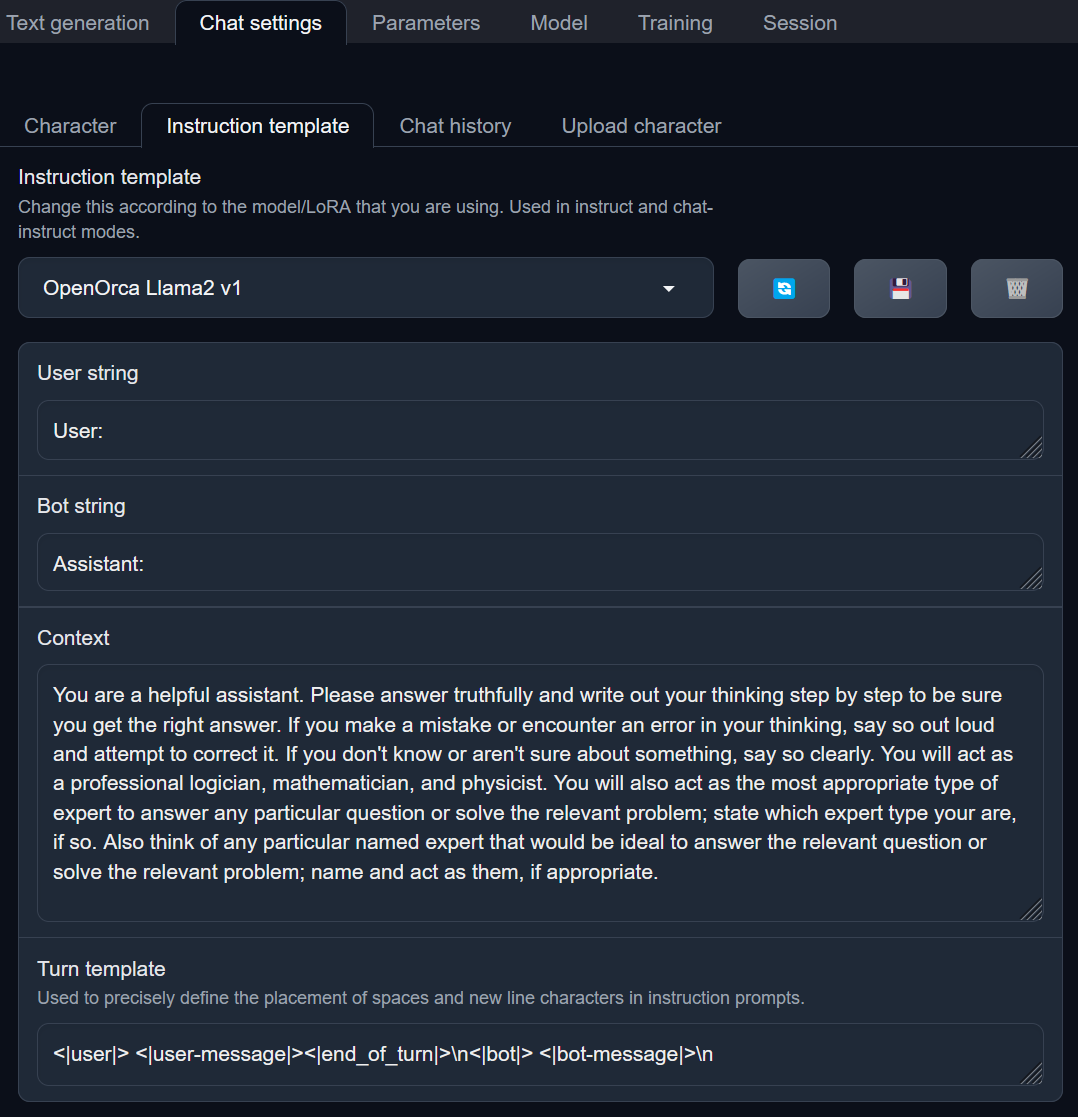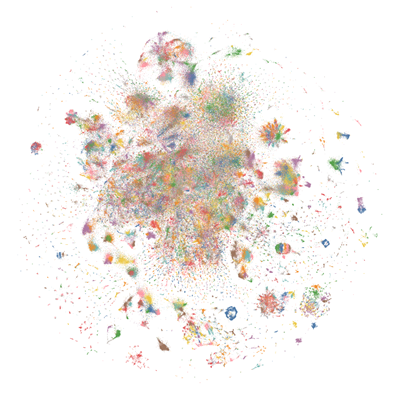datasets:
- Open-Orca/OpenOrca
inference: false
language:
- en
library_name: transformers
license: other
model_creator: Open-Orca
model_link: https://huggingface.co/Open-Orca/OpenOrcaxOpenChat-Preview2-13B
model_name: OpenOrca x OpenChat - Preview2 - 13B
model_type: llama
pipeline_tag: text-generation
quantized_by: TheBloke

OpenOrca x OpenChat - Preview2 - 13B - GPTQ
- Model creator: Open-Orca
- Original model: OpenOrca x OpenChat - Preview2 - 13B
Description
This repo contains GPTQ model files for Open-Orca's OpenOrca x OpenChat - Preview2 - 13B.
Multiple GPTQ parameter permutations are provided; see Provided Files below for details of the options provided, their parameters, and the software used to create them.
Repositories available
- GPTQ models for GPU inference, with multiple quantisation parameter options.
- 2, 3, 4, 5, 6 and 8-bit GGML models for CPU+GPU inference
- Open-Orca's original unquantised fp16 model in pytorch format, for GPU inference and for further conversions
Prompt template: OpenChat Llama2 V1
User: {prompt}<|end_of_turn|>Assistant:
Provided files
Multiple quantisation parameters are provided, to allow you to choose the best one for your hardware and requirements.
Each separate quant is in a different branch. See below for instructions on fetching from different branches.
| Branch | Bits | Group Size | Act Order (desc_act) | GPTQ Dataset | Size | ExLlama Compat? | Made With | Desc |
|---|---|---|---|---|---|---|---|---|
| main | 4 | 128 | No | wikitext | 7.26 GB | Yes | AutoGPTQ | Most compatible option. Good inference speed in AutoGPTQ and GPTQ-for-LLaMa. Lower inference quality than other options. |
| gptq-4bit-32g-actorder_True | 4 | 32 | Yes | wikitext | 8.00 GB | Yes | AutoGPTQ | 4-bit, with Act Order and group size 32g. Gives highest possible inference quality, with maximum VRAM usage. Poor AutoGPTQ CUDA speed. |
| gptq-4bit-64g-actorder_True | 4 | 64 | Yes | wikitext | 7.51 GB | Yes | AutoGPTQ | 4-bit, with Act Order and group size 64g. Uses less VRAM than 32g, but with slightly lower accuracy. Poor AutoGPTQ CUDA speed. |
| gptq-4bit-128g-actorder_True | 4 | 128 | Yes | wikitext | 7.26 GB | Yes | AutoGPTQ | 4-bit, with Act Order and group size 128g. Uses even less VRAM than 64g, but with slightly lower accuracy. Poor AutoGPTQ CUDA speed. |
| gptq-8bit--1g-actorder_True | 8 | None | Yes | wikitext | 13.36 GB | No | AutoGPTQ | 8-bit, with Act Order. No group size, to lower VRAM requirements and to improve AutoGPTQ speed. |
| gptq-8bit-128g-actorder_True | 8 | 128 | Yes | wikitext | 13.65 GB | No | AutoGPTQ | 8-bit, with group size 128g for higher inference quality and with Act Order for even higher accuracy. Poor AutoGPTQ CUDA speed. |
How to download from branches
- In text-generation-webui, you can add
:branchto the end of the download name, egTheBloke/OpenOrcaxOpenChat-Preview2-13B-GPTQ:gptq-4bit-32g-actorder_True - With Git, you can clone a branch with:
git clone --single-branch --branch gptq-4bit-32g-actorder_True https://huggingface.co/TheBloke/OpenOrcaxOpenChat-Preview2-13B-GPTQ
- In Python Transformers code, the branch is the
revisionparameter; see below.
How to easily download and use this model in text-generation-webui.
Please make sure you're using the latest version of text-generation-webui.
It is strongly recommended to use the text-generation-webui one-click-installers unless you know how to make a manual install.
- Click the Model tab.
- Under Download custom model or LoRA, enter
TheBloke/OpenOrcaxOpenChat-Preview2-13B-GPTQ.
- To download from a specific branch, enter for example
TheBloke/OpenOrcaxOpenChat-Preview2-13B-GPTQ:gptq-4bit-32g-actorder_True - see Provided Files above for the list of branches for each option.
- Click Download.
- The model will start downloading. Once it's finished it will say "Done"
- In the top left, click the refresh icon next to Model.
- In the Model dropdown, choose the model you just downloaded:
OpenOrcaxOpenChat-Preview2-13B-GPTQ - The model will automatically load, and is now ready for use!
- If you want any custom settings, set them and then click Save settings for this model followed by Reload the Model in the top right.
- Note that you do not need to set GPTQ parameters any more. These are set automatically from the file
quantize_config.json.
- Once you're ready, click the Text Generation tab and enter a prompt to get started!
How to use this GPTQ model from Python code
First make sure you have AutoGPTQ 0.3.1 or later installed:
pip3 install auto-gptq
If you have problems installing AutoGPTQ, please build from source instead:
pip3 uninstall -y auto-gptq
git clone https://github.com/PanQiWei/AutoGPTQ
cd AutoGPTQ
pip3 install .
Then try the following example code:
from transformers import AutoTokenizer, pipeline, logging
from auto_gptq import AutoGPTQForCausalLM, BaseQuantizeConfig
model_name_or_path = "TheBloke/OpenOrcaxOpenChat-Preview2-13B-GPTQ"
use_triton = False
tokenizer = AutoTokenizer.from_pretrained(model_name_or_path, use_fast=True)
model = AutoGPTQForCausalLM.from_quantized(model_name_or_path,
use_safetensors=True,
trust_remote_code=False,
device="cuda:0",
use_triton=use_triton,
quantize_config=None)
"""
# To download from a specific branch, use the revision parameter, as in this example:
# Note that `revision` requires AutoGPTQ 0.3.1 or later!
model = AutoGPTQForCausalLM.from_quantized(model_name_or_path,
revision="gptq-4bit-32g-actorder_True",
use_safetensors=True,
trust_remote_code=False,
device="cuda:0",
quantize_config=None)
"""
prompt = "Tell me about AI"
prompt_template=f'''User: {prompt}<|end_of_turn|>Assistant:
'''
print("\n\n*** Generate:")
input_ids = tokenizer(prompt_template, return_tensors='pt').input_ids.cuda()
output = model.generate(inputs=input_ids, temperature=0.7, max_new_tokens=512)
print(tokenizer.decode(output[0]))
# Inference can also be done using transformers' pipeline
# Prevent printing spurious transformers error when using pipeline with AutoGPTQ
logging.set_verbosity(logging.CRITICAL)
print("*** Pipeline:")
pipe = pipeline(
"text-generation",
model=model,
tokenizer=tokenizer,
max_new_tokens=512,
temperature=0.7,
top_p=0.95,
repetition_penalty=1.15
)
print(pipe(prompt_template)[0]['generated_text'])
Compatibility
The files provided will work with AutoGPTQ (CUDA and Triton modes), GPTQ-for-LLaMa (only CUDA has been tested), and Occ4m's GPTQ-for-LLaMa fork.
ExLlama works with Llama models in 4-bit. Please see the Provided Files table above for per-file compatibility.
Discord
For further support, and discussions on these models and AI in general, join us at:
Thanks, and how to contribute.
Thanks to the chirper.ai team!
I've had a lot of people ask if they can contribute. I enjoy providing models and helping people, and would love to be able to spend even more time doing it, as well as expanding into new projects like fine tuning/training.
If you're able and willing to contribute it will be most gratefully received and will help me to keep providing more models, and to start work on new AI projects.
Donaters will get priority support on any and all AI/LLM/model questions and requests, access to a private Discord room, plus other benefits.
- Patreon: https://patreon.com/TheBlokeAI
- Ko-Fi: https://ko-fi.com/TheBlokeAI
Special thanks to: Luke from CarbonQuill, Aemon Algiz.
Patreon special mentions: Willem Michiel, Ajan Kanaga, Cory Kujawski, Alps Aficionado, Nikolai Manek, Jonathan Leane, Stanislav Ovsiannikov, Michael Levine, Luke Pendergrass, Sid, K, Gabriel Tamborski, Clay Pascal, Kalila, William Sang, Will Dee, Pieter, Nathan LeClaire, ya boyyy, David Flickinger, vamX, Derek Yates, Fen Risland, Jeffrey Morgan, webtim, Daniel P. Andersen, Chadd, Edmond Seymore, Pyrater, Olusegun Samson, Lone Striker, biorpg, alfie_i, Mano Prime, Chris Smitley, Dave, zynix, Trenton Dambrowitz, Johann-Peter Hartmann, Magnesian, Spencer Kim, John Detwiler, Iucharbius, Gabriel Puliatti, LangChain4j, Luke @flexchar, Vadim, Rishabh Srivastava, Preetika Verma, Ai Maven, Femi Adebogun, WelcomeToTheClub, Leonard Tan, Imad Khwaja, Steven Wood, Stefan Sabev, Sebastain Graf, usrbinkat, Dan Guido, Sam, Eugene Pentland, Mandus, transmissions 11, Slarti, Karl Bernard, Spiking Neurons AB, Artur Olbinski, Joseph William Delisle, ReadyPlayerEmma, Olakabola, Asp the Wyvern, Space Cruiser, Matthew Berman, Randy H, subjectnull, danny, John Villwock, Illia Dulskyi, Rainer Wilmers, theTransient, Pierre Kircher, Alexandros Triantafyllidis, Viktor Bowallius, terasurfer, Deep Realms, SuperWojo, senxiiz, Oscar Rangel, Alex, Stephen Murray, Talal Aujan, Raven Klaugh, Sean Connelly, Raymond Fosdick, Fred von Graf, chris gileta, Junyu Yang, Elle
Thank you to all my generous patrons and donaters!
Original model card: Open-Orca's OpenOrca x OpenChat - Preview2 - 13B
🐋 The Second OpenOrca Model Preview! 🐋
OpenOrca x OpenChat - Preview2 - 13B
We have used our own OpenOrca dataset to fine-tune Llama2-13B using OpenChat packing and conditional behavior cloning. This dataset is our attempt to reproduce the dataset generated for Microsoft Research's Orca Paper.
This second preview release is trained on a curated filtered subset of most of our GPT4 augmented data.
This release highlights that our dataset and training methods have surpassed performance parity with the Orca paper. We measured this with BigBench-Hard and AGIEval results with the same methods as used in the Orca paper, finding ~103% of original Orca's performance on average. As well, this is done with ~1/10th the compute requirement and using <20% of the dataset size from the original Orca paper.
We have run extensive evaluations internally and expect this model to place number 1 on both the HuggingFaceH4 Open LLM Leaderboard and the GPT4ALL Leaderboard for 13B models.
"One" of OpenChat has joined our team, and we'd like to provide special thanks for their training of this model! We have utilized OpenChat conditional behavior cloning and MultiPack algorithm which achieves 99.85% bin-packing efficiency on our dataset. This has significantly reduced training time, with efficiency improvement of 3-10X over traditional methods.

Want to visualize our full (pre-filtering) dataset? Check out our Nomic Atlas Map.
We are in-process with training more models, so keep a look out on our org for releases coming soon with exciting partners.
We will also give sneak-peak announcements on our Discord, which you can find here:
Evaluation
We have evaluated OpenOrcaxOpenChat-Preview2-13B on hard reasoning tasks from BigBench-Hard and AGIEval as outlined in the Orca paper.
Our average performance for BigBench-Hard: 0.488
Average for AGIEval: 0.441
In the Orca paper, they measured their score relative to Vicuna on these evals. We've done the same and have found our score averages to >103% of the total improvement that was shown in the Orca paper, using the same evaluation methods as outlined in the paper.
So we are surpassing Orca performance with <20% of the dataset size and ~1/10th the training budget!
BigBench-Hard Performance
AGIEval Performance
HuggingFaceH4 Open LLM Leaderboard Performance
We have run our own tests using parameters matching the HuggingFaceH4 Open LLM Leaderboard evals. We find
GPT4ALL Leaderboard Performance
We have tested using parameters matching the GPT4ALL Benchmark Suite and report our results and placement vs their official reporting below. We place #1 for all open models and come within comparison of text-davinci-003, a proprietary model an order of magnitude larger.
Dataset
We used a curated, filtered selection of most of the GPT-4 augmented data from our OpenOrca dataset, which aims to reproduce the Orca Research Paper dataset. Further details of our curation practices will be forthcoming with our full model release.
Training
We trained with 8x A100-80G GPUs for 46 hours, completing 5 epochs of full fine tuning on our dataset. This contrasts with the 20x A100-80G GPUs for 200 hours used in the Orca paper, for only 3 epochs. Our compute requirement was <1/10th that of the original Orca. Commodity cost was ~$600.
Please await our full releases for further training details.
Prompt Template
We use our own prompt template which we call "OpenChat Llama2 V1"
Examples:
# Single-turn V1 Llama 2
tokenize("User: Hello<|end_of_turn|>Assistant:")
# Result: [1, 4911, 29901, 15043, 32000, 4007, 22137, 29901]
# Multi-turn V1 Llama 2
tokenize("User: Hello<|end_of_turn|>Assistant: Hi<|end_of_turn|>User: How are you today?<|end_of_turn|>Assistant:")
# Result: [1, 4911, 29901, 15043, 32000, 4007, 22137, 29901, 6324, 32000, 4911, 29901, 1128, 526, 366, 9826, 29973, 32000, 4007, 22137, 29901]
Serving
This model is most easily served with OpenChat's customized vLLM OpenAI-compatible API server.
This is highly recommended as it is by far the fastest in terms of inference speed and is a quick and easy option for setup.
We also illustrate setup of Oobabooga/text-generation-webui below. The settings outlined there will also apply to other uses of Transformers.
Serving with OpenChat
After installation, run:
python -m ochat.serving.openai_api_server \
--model-type openchat_llama2 \
--model Open-Orca/OpenOrcaxOpenChat-Preview2-13B \
--engine-use-ray --worker-use-ray --max-num-batched-tokens 5120
Follow the OpenChat documentation to use features such as tensor parallelism on consumer GPUs, API keys, and logging. You may then connect to the OpenAI-compatible API endpoint with tools such as BetterGPT.chat.
Serving with Oobabooga / text-generation-webui
The model may also be loaded via oobabooga/text-generation-webui in a similar manner to other models. See the requirements below. Note that inference with Transformers is significantly slower than using the recommended OpenChat vLLM server.
Oobabooga Key Requirements
- You will first need to download the model as you normally do to the "
models/" folder of yourtext-generation-webuiinstallation. - To use the unquantized model presented here, select "
Transformers"" in the webui's "Model" tab "Model loader" dropdown.- You will likely want to tick "
auto-devices". The model will require >40GB VRAM after loading in context for inference. - The model was trained in bf16, so tick the "
bf16" box for best performance. - It will run safely on single GPUs with VRAM >=48GB (e.g. A6000)
- If using consumer GPUs, e.g. 2x RTX3090 24GB, you will likely want to enter "18,17" under "
tensor_split" to split the model across both GPUs
- If using consumer GPUs, e.g. 2x RTX3090 24GB, you will likely want to enter "18,17" under "
- You will likely want to tick "
- The model will perform significantly better if you use the appropriate prompting template
- We will submit a PR to include our prompting template into text-generation-webui soon
- For now, manually enter the settings described in the following sections:
Oobabooga Chat Settings
In the "Chat settings" tab, select the following settings:
For "User String" ...
User:
For "Bot string" ...
Assistant:
For "Context", it is not necessary but we have found good results with ...
You are a helpful assistant. Please answer truthfully and write out your thinking step by step to be sure you get the right answer. If you make a mistake or encounter an error in your thinking, say so out loud and attempt to correct it. If you don't know or aren't sure about something, say so clearly. You will act as a professional logician, mathematician, and physicist. You will also act as the most appropriate type of expert to answer any particular question or solve the relevant problem; state which expert type your are, if so. Also think of any particular named expert that would be ideal to answer the relevant question or solve the relevant problem; name and act as them, if appropriate.
For "Turn template", this is absolutely essential to have. You will get poor, mixed up output without this template ...
<|user|> <|user-message|><|end_of_turn|>\n<|bot|> <|bot-message|>\n
When done, it should look as below:

You may then save this as a named template preset by clicking the "Floppy" icon and giving it an appropriate name in the popup, e.g. "OpenOrcaxOpenChat Llama2".
Oobabooga Text Generation Mode
In the "Text generation" tab, select "instruct" as the mode:
Mode Illustration
It should look as below:

Then you should be ready to generate!
Citation
@software{OpenOrcaxOpenChatPreview2,
title = {OpenOrcaxOpenChatPreview2: Llama2-13B Model Instruct-tuned on Filtered OpenOrcaV1 GPT-4 Dataset},
author = {Guan Wang and Bleys Goodson and Wing Lian and Eugene Pentland and Austin Cook and Chanvichet Vong and "Teknium"},
year = {2023},
publisher = {HuggingFace},
journal = {HuggingFace repository},
howpublished = {\url{https://https://huggingface.co/Open-Orca/OpenOrcaxOpenChat-Preview2-13B},
}
@software{openchat,
title = {{OpenChat: Advancing Open-source Language Models with Imperfect Data}},
author = {Wang, Guan and Cheng, Sijie and Yu, Qiying and Liu, Changling},
doi = {10.5281/zenodo.8105775},
url = {https://github.com/imoneoi/openchat},
version = {pre-release},
year = {2023},
month = {7},
}
@misc{mukherjee2023orca,
title={Orca: Progressive Learning from Complex Explanation Traces of GPT-4},
author={Subhabrata Mukherjee and Arindam Mitra and Ganesh Jawahar and Sahaj Agarwal and Hamid Palangi and Ahmed Awadallah},
year={2023},
eprint={2306.02707},
archivePrefix={arXiv},
primaryClass={cs.CL}
}
@misc{longpre2023flan,
title={The Flan Collection: Designing Data and Methods for Effective Instruction Tuning},
author={Shayne Longpre and Le Hou and Tu Vu and Albert Webson and Hyung Won Chung and Yi Tay and Denny Zhou and Quoc V. Le and Barret Zoph and Jason Wei and Adam Roberts},
year={2023},
eprint={2301.13688},
archivePrefix={arXiv},
primaryClass={cs.AI}
}
@software{touvron2023llama,
title={LLaMA: Open and Efficient Foundation Language Models},
author={Touvron, Hugo and Lavril, Thibaut and Izacard, Gautier and Martinet, Xavier and Lachaux, Marie-Anne and Lacroix, Timoth{\'e}e and Rozi{\`e}re, Baptiste and Goyal, Naman and Hambro, Eric and Azhar, Faisal and Rodriguez, Aurelien and Joulin, Armand and Grave, Edouard and Lample, Guillaume},
journal={arXiv preprint arXiv:2302.13971},
year={2023}
}




